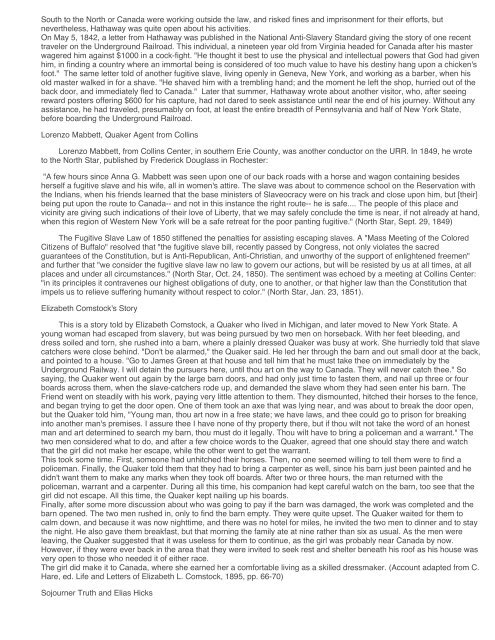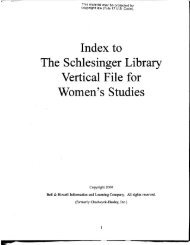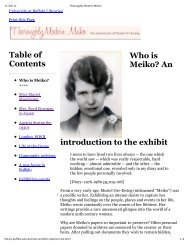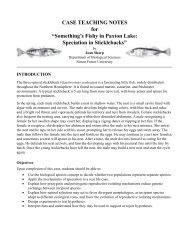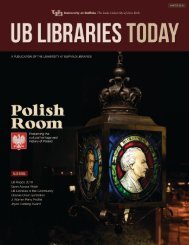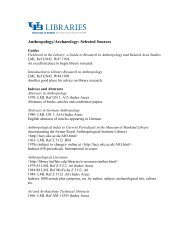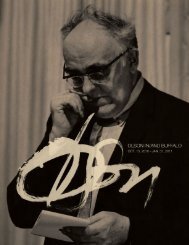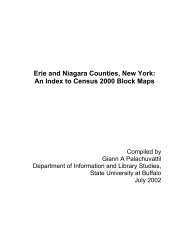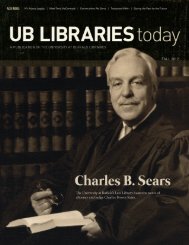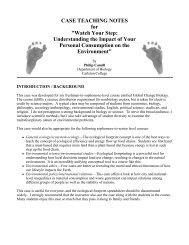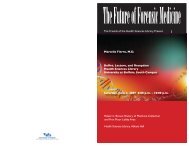Quakers and Abolition - University at Buffalo Libraries
Quakers and Abolition - University at Buffalo Libraries
Quakers and Abolition - University at Buffalo Libraries
Create successful ePaper yourself
Turn your PDF publications into a flip-book with our unique Google optimized e-Paper software.
South to the North or Canada were working outside the law, <strong>and</strong> risked fines <strong>and</strong> imprisonment for their efforts, but<br />
nevertheless, H<strong>at</strong>haway was quite open about his activities.<br />
On May 5, 1842, a letter from H<strong>at</strong>haway was published in the N<strong>at</strong>ional Anti-Slavery St<strong>and</strong>ard giving the story of one recent<br />
traveler on the Underground Railroad. This individual, a nineteen year old from Virginia headed for Canada after his master<br />
wagered him against $1000 in a cock-fight. "He thought it best to use the physical <strong>and</strong> intellectual powers th<strong>at</strong> God had given<br />
him, in finding a country where an immortal being is considered of too much value to have his destiny hang upon a chicken's<br />
foot." The same letter told of another fugitive slave, living openly in Geneva, New York, <strong>and</strong> working as a barber, when his<br />
old master walked in for a shave. "He shaved him with a trembling h<strong>and</strong>; <strong>and</strong> the moment he left the shop, hurried out of the<br />
back door, <strong>and</strong> immedi<strong>at</strong>ely fled to Canada." L<strong>at</strong>er th<strong>at</strong> summer, H<strong>at</strong>haway wrote about another visitor, who, after seeing<br />
reward posters offering $600 for his capture, had not dared to seek assistance until near the end of his journey. Without any<br />
assistance, he had traveled, presumably on foot, <strong>at</strong> least the entire breadth of Pennsylvania <strong>and</strong> half of New York St<strong>at</strong>e,<br />
before boarding the Underground Railroad.<br />
Lorenzo Mabbett, Quaker Agent from Collins<br />
Lorenzo Mabbett, from Collins Center, in southern Erie County, was another conductor on the URR. In 1849, he wrote<br />
to the North Star, published by Frederick Douglass in Rochester:<br />
"A few hours since Anna G. Mabbett was seen upon one of our back roads with a horse <strong>and</strong> wagon containing besides<br />
herself a fugitive slave <strong>and</strong> his wife, all in women's <strong>at</strong>tire. The slave was about to commence school on the Reserv<strong>at</strong>ion with<br />
the Indians, when his friends learned th<strong>at</strong> the base ministers of Slaveocracy were on his track <strong>and</strong> close upon him, but [their]<br />
being put upon the route to Canada-- <strong>and</strong> not in this instance the right route-- he is safe.... The people of this place <strong>and</strong><br />
vicinity are giving such indic<strong>at</strong>ions of their love of Liberty, th<strong>at</strong> we may safely conclude the time is near, if not already <strong>at</strong> h<strong>and</strong>,<br />
when this region of Western New York will be a safe retre<strong>at</strong> for the poor panting fugitive." (North Star, Sept. 29, 1849)<br />
The Fugitive Slave Law of 1850 stiffened the penalties for assisting escaping slaves. A "Mass Meeting of the Colored<br />
Citizens of <strong>Buffalo</strong>" resolved th<strong>at</strong> "the fugitive slave bill, recently passed by Congress, not only viol<strong>at</strong>es the sacred<br />
guarantees of the Constitution, but is Anti-Republican, Anti-Christian, <strong>and</strong> unworthy of the support of enlightened freemen"<br />
<strong>and</strong> further th<strong>at</strong> "we consider the fugitive slave law no law to govern our actions, but will be resisted by us <strong>at</strong> all times, <strong>at</strong> all<br />
places <strong>and</strong> under all circumstances." (North Star, Oct. 24, 1850). The sentiment was echoed by a meeting <strong>at</strong> Collins Center:<br />
"in its principles it contravenes our highest oblig<strong>at</strong>ions of duty, one to another, or th<strong>at</strong> higher law than the Constitution th<strong>at</strong><br />
impels us to relieve suffering humanity without respect to color." (North Star, Jan. 23, 1851).<br />
Elizabeth Comstock's Story<br />
This is a story told by Elizabeth Comstock, a Quaker who lived in Michigan, <strong>and</strong> l<strong>at</strong>er moved to New York St<strong>at</strong>e. A<br />
young woman had escaped from slavery, but was being pursued by two men on horseback. With her feet bleeding, <strong>and</strong><br />
dress soiled <strong>and</strong> torn, she rushed into a barn, where a plainly dressed Quaker was busy <strong>at</strong> work. She hurriedly told th<strong>at</strong> slave<br />
c<strong>at</strong>chers were close behind. "Don't be alarmed," the Quaker said. He led her through the barn <strong>and</strong> out small door <strong>at</strong> the back,<br />
<strong>and</strong> pointed to a house. "Go to James Green <strong>at</strong> th<strong>at</strong> house <strong>and</strong> tell him th<strong>at</strong> he must take thee on immedi<strong>at</strong>ely by the<br />
Underground Railway. I will detain the pursuers here, until thou art on the way to Canada. They will never c<strong>at</strong>ch thee." So<br />
saying, the Quaker went out again by the large barn doors, <strong>and</strong> had only just time to fasten them, <strong>and</strong> nail up three or four<br />
boards across them, when the slave-c<strong>at</strong>chers rode up, <strong>and</strong> dem<strong>and</strong>ed the slave whom they had seen enter his barn. The<br />
Friend went on steadily with his work, paying very little <strong>at</strong>tention to them. They dismounted, hitched their horses to the fence,<br />
<strong>and</strong> began trying to get the door open. One of them took an axe th<strong>at</strong> was lying near, <strong>and</strong> was about to break the door open,<br />
but the Quaker told him, "Young man, thou art now in a free st<strong>at</strong>e; we have laws, <strong>and</strong> thee could go to prison for breaking<br />
into another man's premises. I assure thee I have none of thy property there, but if thou wilt not take the word of an honest<br />
man <strong>and</strong> art determined to search my barn, thou must do it legally. Thou wilt have to bring a policeman <strong>and</strong> a warrant." The<br />
two men considered wh<strong>at</strong> to do, <strong>and</strong> after a few choice words to the Quaker, agreed th<strong>at</strong> one should stay there <strong>and</strong> w<strong>at</strong>ch<br />
th<strong>at</strong> the girl did not make her escape, while the other went to get the warrant.<br />
This took some time. First, someone had unhitched their horses. Then, no one seemed willing to tell them were to find a<br />
policeman. Finally, the Quaker told them th<strong>at</strong> they had to bring a carpenter as well, since his barn just been painted <strong>and</strong> he<br />
didn't want them to make any marks when they took off boards. After two or three hours, the man returned with the<br />
policeman, warrant <strong>and</strong> a carpenter. During all this time, his companion had kept careful w<strong>at</strong>ch on the barn, too see th<strong>at</strong> the<br />
girl did not escape. All this time, the Quaker kept nailing up his boards.<br />
Finally, after some more discussion about who was going to pay if the barn was damaged, the work was completed <strong>and</strong> the<br />
barn opened. The two men rushed in, only to find the barn empty. They were quite upset. The Quaker waited for them to<br />
calm down, <strong>and</strong> because it was now nighttime, <strong>and</strong> there was no hotel for miles, he invited the two men to dinner <strong>and</strong> to stay<br />
the night. He also gave them breakfast, but th<strong>at</strong> morning the family <strong>at</strong>e <strong>at</strong> nine r<strong>at</strong>her than six as usual. As the men were<br />
leaving, the Quaker suggested th<strong>at</strong> it was useless for them to continue, as the girl was probably near Canada by now.<br />
However, if they were ever back in the area th<strong>at</strong> they were invited to seek rest <strong>and</strong> shelter bene<strong>at</strong>h his roof as his house was<br />
very open to those who needed it of either race.<br />
The girl did make it to Canada, where she earned her a comfortable living as a skilled dressmaker. (Account adapted from C.<br />
Hare, ed. Life <strong>and</strong> Letters of Elizabeth L. Comstock, 1895, pp. 66-70)<br />
Sojourner Truth <strong>and</strong> Elias Hicks


